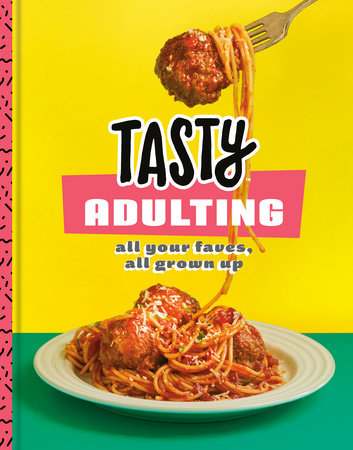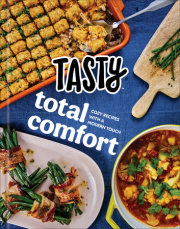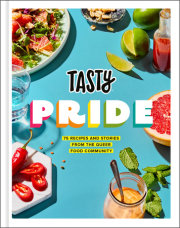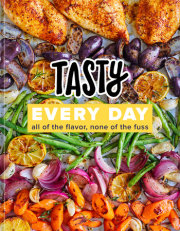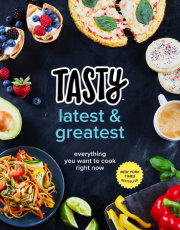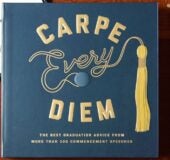IntroductionWhat is adulting? Adulting is stepping up to the plate when it matters. But adulting is also phoning it in when you need to. Adulting is enjoying the freedom that comes with independence, and adulting is learning that actions have consequences. Adulting is treating yourself in flush times, nourishing yourself in lean times, and eating cake for breakfast because you can. Adulting is about having fun, living thoughtfully, taking responsibility, making bad decisions, throwing caution to the wind, practicing self-care, and being iconic.
Did you think we were talking about
life? No, that was about this book. It’s called
Adulting. Welcome to the essential kitchen guide for the young (or young-atheart) adult. From breakfast to dinner, dining solo to hosting friends, it’s everything you need to know about food that’s delicious, interesting, and grown as hell.
How? Well,
Adulting is like your favorite teacher in high school who gave you serious life lessons, but also let you skip class sometimes. You’ll find advice for stocking a pantry with smart ingredients and help in equipping a kitchen that’s ready to tackle anything. Plus the recipes are exactly the kind of fun, exciting, tasty (get it?) meals you’ll be proud to show off! We’ll be there all along the way to offer smart tips to keep you on track, teach you something new, and improve your confidence in the kitchen. Adulthood means learning to let go, take care of yourself, and, well, grow up. Whether you’re moving into your first apartment or you’ve had “get my life together” on your to-do list for years, there is completely necessary advice in this book for you.
How to Approach a RecipeRead it. No, seriously. Read it all the way through. Then read it again.
Don’t skip the headnote or sidebar—these contain important information. We have specifically outlined Life Skills for you throughout this book. These are the technique-driven tips and hacks that we want you to be able to take with you to the next cookbook and the one after that. They’re our grown-up gifts to you.
Notice if there are long gaps in active time, like baking or refrigeration. Imagine each step of the process and see if any questions come up for you. Basically, think of a recipe as a map: Look at where you’re going and be sure you know how you’re getting there. If you’re not sure, look it up! There’s a time to wing it and a time to learn. Preparation time is about learning.
Now start to gather your ingredients. Check out how they are all prepared, especially if it’s in more than one way. Prepare and separate them as instructed. Chop everything so you’re not wasting time doing that later (or worse, overcooking one thing while you rush to slice the next thing!). Use a plate, bowls, and/or a cutting board to arrange your ingredients into groups so they’ll be together when you need them. Do four dry spices go in the pot at the same time? Premeasure them all into a small bowl so you can accomplish that in a flick of the wrist. Are onions going in right after the butter? Line them up side by side so you can work in order. If there is a long gap in active time, prepare only what you need now. Use the downtime to prepare for the next portion so the ingredients are fresh.
This very adult act of being prepared is called
mise en place; it’s a French term that means “put in place.” It might seem like a waste of time to mise en place instead of tackling each step on the fly, but trust us on this one: An organized cook is a relaxed cook. And saying it in French is even more mature.
How to Nail It Every TimeThis is the fun part. Turn on a playlist you love, crank the volume, and start with step one.
Remember that cooking is not a race. Relax and work with focus. Don’t rush to the next step because you think the food is ready or because you’re hangry. Confirm that what is supposed to happen
is actually happening—our recipes will always give you a time range, but we’ll also tell you how to know it’s working. Use your senses to check in constantly. Are you hearing a sizzle when the chicken breast hits the pan? Do those biscuits look golden brown? Can you smell the spice mix blooming? Does that saut.ed bell pepper feel crisp or tender or crisp-tender?
The most important sense of all is the sense of taste. Taste, taste, taste, every step of the way! The number one thing that takes a dish from
wahhh to
wow is seasoning well. Keep a small bowl of kosher salt and a pepper grinder within reach. As each component is finished, take a little bite and ask yourself: Does this taste good? If you think so, it seems likely others will, too.
Finally, every pro cook knows that a clean workspace is the best workspace. Move prep bowls or plates to the sink as you empty them (bonus points if you find time to wash them during a pause in active cooking time!), wipe down the counter, clean your cutting board in between uses, and keep your utensils on a rest. Nothing feels better than sitting down to eat with half the dishes already done.
How to Nail It When You're Definitely Not Nailing ItThe most important step in learning to cook is actually cooking. Like any skill, it takes practice, patience, and perseverance. Get in the kitchen and make mistakes! Burn things, oversalt, skip a step, forget to turn the oven on.
But let each mistake be a lesson on your way to becoming a smarter, more attentive cook. There’s a time to wing it and a time to learn. When things go off the rails, wing it. Check in with your senses and ask what you can do to save this meal. Do you smell something burning? Take it off the stove and reduce the heat before you go to the next step. Was your pinch of salt more like a small handful? See if adding some oil, broth, or water would make sense to regain balance. Is your oven smoking? Open the door, wave a towel to clear the air, and assess the damage.
Smart problem-solving can bring almost anything back from the brink. (And never underestimate a shower of fresh parsley or a squeeze of lemon to cover imperfections!) If it doesn’t come out exactly as you’d planned, don’t stress. Serve what you can and don’t apologize for it. Worst case, you start over. Worst-worst case, you order a pizza. And pizza really isn’t all that bad. All that matters is you try again. And again. And again.
How to Navigate This BookTake it chapter by chapter and let your stomach decide!
Pasta la Vista will have you executing a noodle night without searching for your rubber frisbee of a jar opener—no, you’ll have hot tomato sauce bubbling away
that you made. Souper Heroes will help you stock your freezer with neatly labeled soups, ready for the day when you
just can’t even and need comfort at your core. Salad Days will up your desk lunch game with colorful concoctions that don’t cost $12, entitling you to low-key bragging without having
to say a word.
Dive off the deep end with fish, a very adult protein that’s quick and adaptable. Or boost your chicken, steak, and pork with exciting new flavors that are as addictive as they are easy. Ditch the processed, packaged faux-meat for whole-food vegetarian (we see you!) meals that are equally nourishing and exciting.
But
Adulting is also like, “I’m a cool mom!” so A Balanced Breakfast straddles the line between smart starts to the day and junky ones (that, tbh, are also sort of smart). A Sweet Finish will have you whipping up seriously impressive desserts that look a hundred times harder than they are. And when you are hosting friends—probably the greatest perk of being an adult—Company’s Coming is an all-out celebration!
This book will also teach you how you can drag some of your childhood favorites into adulthood with you. Literally, we adulted them. Start your morning with Homemade Breakfast Tarts (see page 24), a delicious sub for your favorite toaster tarts. Your inner sixyear- old, who still craves veggies and ranch (everyone’s favorite snack), will love Charred Carrots and Broccoli with Ranch Yogurt (see page 58). Things like Spaghetti and Meatballs Done Right (see page 74) and Perfect Roast Chicken (see page 114) are the nostalgic Sunday supper vibes you need when you’re missing home. Distant memories of soggy microwaved fish sticks will be banished forever by Beer-Battered Fish and Rings (see page 94). And having friends over will feel sophisticated AF after you learn A Cheese Plate Done Right (see page 170).
The absolute best part of
Adulting is owning all of these recipes. Casually mentioning that you have a Seared Tuna Salad (see page 102) or Flourless Chocolate Dream Cake (see page 154) in your back pocket is so grown up. Rolling into a party with a Guacamole Glow Up (see page 175) or gathering your loved ones for Cozy Chicken and Dumplings (see page 122) is unbelievably mature. Pulling a batch of Carrot Cake Muffins (see page 29) out of the oven or Chicken Noodle Soup (see page 42) off the stove is practically Martha Stewart–level. But best of all is diving in, making something great for yourself, and discovering that you had it in you all along.
That, my friend, is peak
Adulting.
Copyright © 2020 by Tasty. All rights reserved. No part of this excerpt may be reproduced or reprinted without permission in writing from the publisher.





